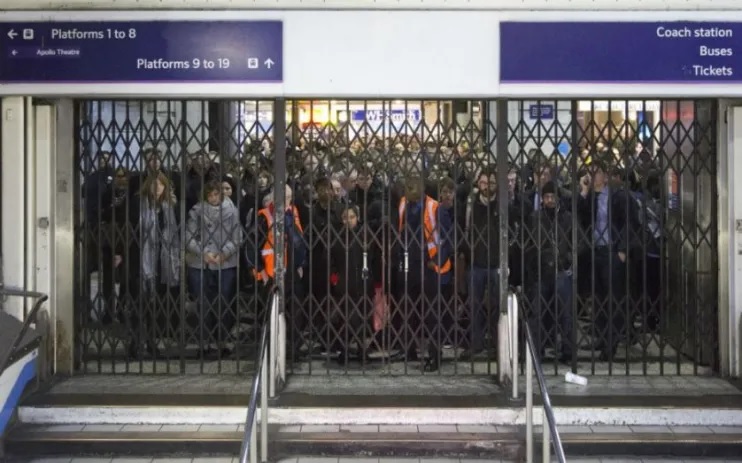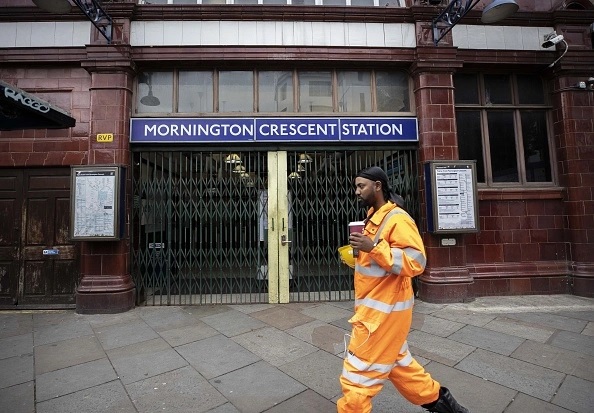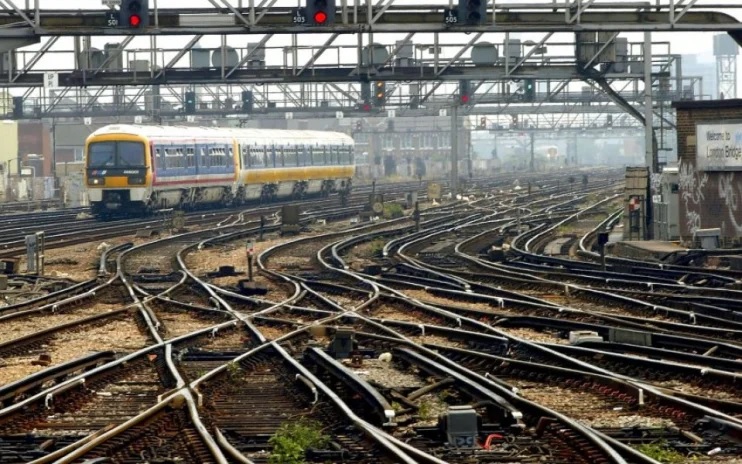Train chaos: How will the rail and Tube strikes affect services across London and the UK today?

Rail and Tube strikes are set to cripple services this week, causing travel chaos for passengers across the UK as members of the Rail, Maritime and Transport (RMT) union at Network Rail and 13 train operators are going on strike.
Here is a quick rundown of what to expect today and this week.
– When are the strikes?
Tuesday, Thursday and Saturday.
– How bad will the disruption be?
Fewer than one in five trains will run, and only on main lines and only for around 11 hours, starting later and finishing earlier.
– Will there be strikes on the London Underground?
Yes. Members of the RMT and Unite will strike on Tuesday.
– Are other unions involved in the dispute?
Yes. The Transport Salaried Staffs Association and the drivers union Aslef are also taking industrial action or balloting for strikes.
– What are the strikes about?
The railways are proposing to make efficiency savings, especially as fewer passengers are travelling by train because of the pandemic, which has led to more people working from home.
– Why are the unions striking?
They argue that many of their members worked throughout the virus crisis and were hailed as ‘Covid heroes’ but now face job cuts, changes to their working conditions and pay rises well below the rate of inflation following years of wage freezes.
– Will there be more strikes after this week?
Yes. Members of Aslef on the Croydon Tramlink will stage a 48-hour walkout next week, and more strikes are likely if there is not a breakthrough.
– Have there been talks to try to resolve the dispute?
Yes. Talks continued until Monday, involving senior RMT and rail industry officials.
– Why hasn’t the Government been involved in the negotiations?
Transport Secretary Grant Shapps said it is up to the unions and employers to negotiate pay and conditions, but Labour and the unions believe he should be taking part in the talks.

– What are the efficiency savings the industry wants?
They largely revolve around the use of new technology, such as drones to check on railway tracks rather than having workers walk along lines.
– How many jobs are likely to be lost?
Unions believe between 2,000 and 2,500 jobs are at risk.
– Who are the union leaders?
The RMT general secretary is Mick Lynch, who has worked for the union for decades after an earlier career in the building industry. He took over from Mick Cash, who had succeeded Bob Crow after his sudden death.
The TSSA is led by Manuel Cortes, and Aslef by Mick Whelan, who are both long standing officials in the rail unions.
– Are the union leaders driving the strikes?
Thousands of RMT members voted overwhelmingly in favour of strikes, while similar outcomes are expected among TSSA and Aslef members currently being balloted.
– Has a pay offer been made and what are the unions asking for?
Lynch said that an offer of a 2% pay increase had been made, with the potential to go 3% if all of the reforms are accepted.
The unions point to the 11% rate of RPI inflation, although they have not formally put a figure on their demands.
Business bosses predict ‘incredible’ damage
Business chiefs have warned that continued strike actions would cause “incredible” damage to the UK in both the short-term and long-term as firms brace themselves for heavy disruption.
Economists at the Centre for Economics and Business Research (CEBR) have warned that the three strikes across Tuesday, Thursday and Saturday will have a fallout worth at least £91 million to the UK economy.
Industry leaders have warned that the costs could be even more as travellers and commuters decide to stay at home.
Richard Burge, chief executive of the London Chamber of Commerce and Industry, warned that the capital “cannot afford a summer of chaos on the railways and tube lines”.
The business boss called for the RMT union, Network Rail, and the Government to return to negotiations amid fears that this week’s action could be repeated later this year.
“While this strike will be damaging, a recession is looking likely regardless; as such, I wouldn’t pin an eventual recession on this strike,” he said.
“What is very worrying is the possibility that this dispute continues through the year and we see multiple strikes into the future.”
Richard Burge, chief executive of the London Chamber of Commerce and Industry
“A week lost every month for the foreseeable future is going to do incredible short-term and long-term damage to the economy and the UK’s reputation as an attractive destination for investment.”
The CEBR has predicted that almost 50% of the impact of the strikes will be felt on Tuesday, when both tube and rail workers are involved in strike action.
Hospitality and retail firms are expected to be particularly vulnerable to a financial hit from the loss of trade.
Kate Nicholls, chief executive of UKHospitality, has warned that the rail strike could cost the sector up to £540m.
She said: “Fragile consumer confidence will take a further hit, thousands of people able and willing to spend money in hospitality venues across the country will be prevented from doing so, while staff will undoubtedly struggle to even get to work.
“We should all be pulling in the same direction if we’re to get the UK economy back on track, and want to see urgent and productive talks to avoid widespread disruption, next week.”
Kate Nicholls, chief executive of UKHospitality,
Meanwhile, James Hardiman, senior analyst at the British Retail Consortium (BRC), said: “Unsurprisingly, the upcoming rail strikes will be damaging for retail, as the strikes limit commuter and customer traffic.
“UK footfall is already down on pre-pandemic levels, and this will only slow the progress retailers have made to bring people back in-store.”
NHS braces for disruption to patients
The NHS “remains open”, leading medics have said as the health service prepares for disruption caused by rail strikes.
Patients have been urged to plan ahead for appointments.
And hospitals have made arrangements to ensure staff will be on site, including setting up park-and-ride services and taxi-sharing facilities.
The strikes could have a particular impact on hospitals in London, many of which have limited parking capacity for those considering driving to appointments as an alternative.

While buses are still operating it is expected these will be busier than usual due to the strikes. Many trusts have urged patients to get in touch if they cannot attend their appointment due to strikes.
The Royal Free said in a statement: “Our hospitals will be open as normal but please do let us know in advance if you are unable to attend your appointment.”
King’s College Hospital said: “We recognise that some patients and visitors are likely to experience difficulty accessing our hospital sites on the strike days, but also on the days in-between.
“We would like to reassure patients and visitors that hospital services will continue as normal during this period.”
Meanwhile patients were warned of potential delays if they were late for appointments due to travel disruption.
Barts Health, one of the biggest trusts in London, said in a statement: “Our staff will be flexible with appointment timings, allowing for the fact that patients may be delayed on route.
“Please note that you may then experience a wait if you do arrive later than your specified appointment time. If you are delayed on your way to your appointment, please contact the team to let them know.”
Hospitals also warned of “busier than usual” car parks, particularly trusts based in outer London.
As well as affecting patient appointments, the strikes may also hamper NHS staff commutes.
Moorfield’s Eye Hospital in London reminded patients that staff “will have the same difficulties in travelling in to offer appointments as you will”.
Extra measures
Some trusts have put extra measures in place to ensure staff cover during the travel disruption.
“Staff will be coming in, as usual, to ensure those who need us get the care they need. The trust has put a number of measures in place to ensure these staff are unaffected,” Epsom and St Helier University Hospitals NHS Trust said in a statement.
The Trust told PA it had set up a temporary park-and-ride service for staff working at Epsom hospital and it has also expanded its shuttle bus service.
Staff are also being encouraged to cycle, walk or car share while those who can work from home are being asked to do so.
Central and North West London NHS Trust, which provides a range of services including mental health care and sexual health services, added: “Our wards will be fully staffed (we have plans to make sure staff can get to work).”
On Friday, Professor Sir Stephen Powis, national medical director for the NHS in England, said: “With rail strikes expected across the country next week, I am urging those who have appointments booked in to plan ahead and look at alternative options for getting to their GP practice or hospital if needed.
“The NHS sees millions of people every week for urgent and routine care and it is vital that people access the care they need despite disruptions – the NHS remains open, so please do continue to come forward.”